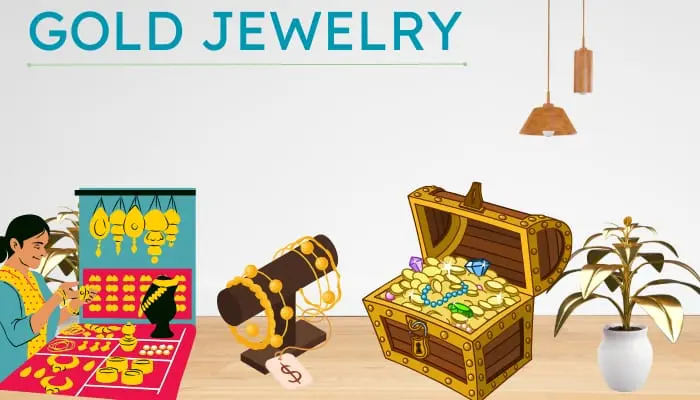What Is Gold? Key Facts You Should Know.
Published: 04 Dec 2024
Gold is one of the most popular elements in the world, known only for its value and beauty.
Scientifically, it is known by the symbol “au” and has an atomic number of 79. Ancient civilizations has been used it fo for centuries and it completely shaped human history.
Here is what gold is, its chemical properties, physical properties, uses, and advantages and disadvantages.
So guys, are you ready to learn more?
What Is Gold?

Gold is a naturally occurring precious metal known for its bright yellow color, softness, and resistance to tarnish.
Guys, you know? Gold is highly valued for its beauty and rarity. You may wonder, it was used as currency for thousands of years in ancient times. However, now it’s a popular choice, especially for jewelry and investments.
It is chemically represented by the symbol Au and has an atomic number of 79. Its soft, dense metal makes it easy to work with for crafting intricate designs and durable items.
Here are some key facts about gold.
Gold in the Periodic Table
- Group: 11 (Transition Metals)
- Atomic Number: 79
- Block: d-block
- Period: 6
- Category: Metal (Noble Metal)
Physical Properties
- State: Solid at room temperature
- Color: Bright yellow, but can vary when alloyed with other metals
- Density: 19.32 g/cm³ (Very dense compared to most other metals)
- Melting Point: 1,064°C (1,947°F)
- Boiling Point: 2,856°C (5,173°F)
- Hardness: 2.5 to 3 on the Mohs scale (Soft and malleable)
- Conductivity: Excellent electrical and thermal conductivity
- Luster: Metallic, shiny appearance
Chemical Properties
- Reactivity: Gold is chemically stable and non-reactive, making it resistant to tarnish or corrosion.
- Corrosion Resistance: Doesn’t oxidize or rust, even over time.
- Solubility: Soluble in aqua regia (a mixture of hydrochloric and nitric acids).
- Oxidation State: Commonly found in the +1 and +3 oxidation states.
- Non-reactivity: Does not react with most acids or chemicals, which is why it maintains its shine.
Atomic Properties
- Atomic Radius: 144 pm (picometers) – A measure of the size of the gold atom.
- Ionization Energy: 890.1 kJ/mol (energy required to remove the outermost electron).
- Electron Configuration: [Xe] 4f¹⁴ 5d¹⁰ 6s¹
- Electronegativity: 2.54 (on the Pauling scale, which indicates gold’s relatively low tendency to attract electrons).
- First Ionization Energy: 890.1 kJ/mol
- Electron Affinity: -222.0 kJ/mol (energy released when an electron is added to a neutral atom of gold).
- Electropositivity: Gold is considered electropositive, meaning it is more likely to lose electrons in chemical reactions.
- Atomic Mass: 196.97 u (atomic mass unit
Historical Facts
- Gold was first invented in the Middle East before 6000 BC
- Its symbol “au” comes from the Latin word ‘’aurum’’ which means gold.
- The word “gold” is derived from the Indo-European word “ghel” which means to shine or yellow.
Isotopes
Gold has only one stable isotope:
- Stable Isotope: Gold-197 (¹⁹⁷Au), which makes up almost all naturally occurring gold.
- Radioactive Isotopes: Gold also has several radioactive isotopes, but they are rare and unstable. These isotopes decay quickly, with gold-198 being used in medical applications for cancer treatment.
Need more information? Let’s dive into the deep guide.
Real-Life Applications of Gold
Gold is a symbol of wealth and luxury and an incredibly versatile metal used in a wide range of industries.

From jewelry to technology, gold’s unique properties make it vital for different purposes. Here is where and how gold is used for other purposes.
- Jewelry: Gold is the go-to metal for crafting stunning jewelry like rings, necklaces, and bracelets because of its beauty, softness, and ability. It’s easy to shape into various designs as needed, which is why jewelers feel happy when creating gold jewelry instead of platinum.
- Currency: Gold has been used for centuries as a currency and is still seen as a solid investment today in the form of gold coins and reserves. It keeps its value longer and is also beneficial for extended storage.
- Electronics: Gold plays a key role in electronics. It’s used in connectors, switches, and circuit boards because of its excellent ability to conduct electricity and resist corrosion.
- Medicine: Gold compounds are used in medical treatments, especially for cancer and arthritis. A scientific study claims they are effective cancer treatments.
- Aerospace: An article by NASA says, “In aerospace, gold helps protect spacecraft and satellites by reflecting infrared radiation, keeping sensitive equipment safe from extreme temperatures.”
- Dentistry: Gold is a favorite for dental work—crowns, fillings, and bridges—because it’s durable, doesn’t irritate the gums, and lasts a long time.
- Awards and Medals: Gold is often used to make essential awards like Olympic medals and trophies. It represents the highest level of achievement and success.
- Investment: Many investors turn to gold as a safe investment. Buying gold bars, coins, or ETFs is the best way to save money against economic uncertainty.
- Cosmetics: High-end skincare products often contain gold, believed to have rejuvenating and anti-aging properties.
- Food: Edible gold leaf is used to decorate gourmet dishes and desserts, adding a touch of luxury and elegance to the dining experience.
So, guys, these uses of gold show that it has a proven worth across a wide range of industries, offering timeless beauty, reliability, and innovation wherever it’s used.
Advantages of Gold
Gold has been used for centuries due to its unique qualities and versatility.
It’s not only a symbol of wealth but also a practical material for various purposes. Here are some highly noticeable benefits of gold that we must know.
- It retains value over time that other metals can’t
- It does not tarnish, rust, or corrode.
- It can be shaped into intricate designs.
- An excellent conductor of electricity.
- Recognized globally as a store of wealth.
- Has a natural luster and appealing color.
- Resistant to most chemical reactions.
- Acts as a hedge against inflation.
Here are the downsides of gold.
Disadvantages of Gold
Despite its benefits, gold has some drawbacks that should be noted. Here are the disadvantages of gold.

- It’s expensive to buy and maintain, which poor people can’t afford.
- It’s also difficult to transport in large quantities.
- Mining causes environmental damage.
- Prices can fluctuate significantly.
- Has fewer industrial uses compared to other metals.
- Does not generate passive income.
- Heavily influenced by economic conditions.
Interesting Facts About Gold
- Gold is included as the rarest metal on Earth, which makes it highly valuable.
- It has been used by humans for over 6,000 years for jewelry, currency, and decoration.
- Gold is chemically inert, meaning it doesn’t tarnish, rust, or corrode over time.
- A single ounce of gold can be stretched into a thin wire over 50 miles long.
- It is the best conductor of electricity, making it vital in electronics and technology.
- About 80% of the gold ever mined is still in circulation today, often recycled.
- Gold is found on every continent, but the most prominent producers are China, Australia, and Russia.
- Ancient Egyptians believed gold was the “flesh of the gods” and used it in burial rituals.
- The total amount of gold ever mined in history would fill just 3 Olympic-sized swimming pools.
- Gold has been used to make coins, starting in the Lydian Kingdom around 600 BCE.
Conclusion.
So guys, in this article, we’ve covered what is gold in detail. We’ve discussed its incredible properties, modern applications, and why it remains a top choice in various industries.
If you’re looking to invest in something timeless or want to understand why gold is such a valued resource, consider the properties of gold and its pricing trends.
But if you have a question or want to give us suggestions, please comment below. I’d love to hear from you.

- Be Respectful
- Stay Relevant
- Stay Positive
- True Feedback
- Encourage Discussion
- Avoid Spamming
- No Fake News
- Don't Copy-Paste
- No Personal Attacks



- Be Respectful
- Stay Relevant
- Stay Positive
- True Feedback
- Encourage Discussion
- Avoid Spamming
- No Fake News
- Don't Copy-Paste
- No Personal Attacks





